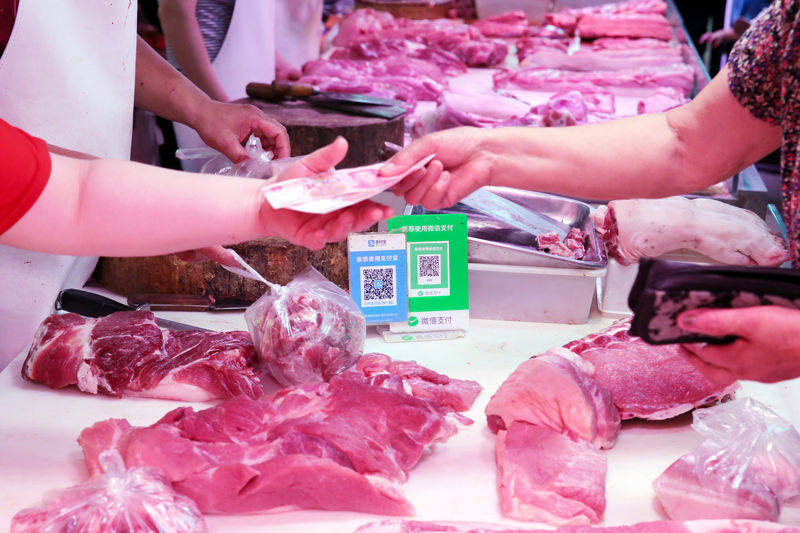By Stella Qiu and Se Young Lee
BEIJING (Reuters) - China's factory price inflation cooled in July amid a slowdown in economic growth with Beijing locked in a heated trade dispute with Washington, although economists expect punitive tariffs on U.S goods to add to wider price pressures in months ahead.
The producer price index (PPI) -- a gauge of factory gate inflation -- rose 4.6 percent in July from a year earlier, according to the National Bureau of Statistics (NBS). That was slower than 4.7 percent in June but faster than the 4.4 percent forecast in a Reuters poll.
The July inflation data is the first official reading on the impact on prices from China's tariffs on $34 billion of U.S. goods that went into effect on July 6 and apply to a range of products from soybeans, to mixed nuts and whiskey.
Signs that inflation remains benign will provide some latitude for policymakers who have placed a priority on shoring up the slowing economy through various easing measures.
"Looking ahead, China's retaliatory tariffs against the U.S. and the renminbi's recent depreciation will put some upward pressure on import prices," said Julian Evans-Pritchard, Senior China Economics at Capital Economics.
But while Capital Economics have nudged up their PPI forecasts for this year and the next, they note still significant downward pressures on prices from the challenging trade environment.
"The big picture is that we still think inflation on both (consumer and producer) measures is set to cool during the coming quarters as China's economy slows and commodity prices fall," Evans-Pritchard said. "This should give the People's Bank plenty of room to further loosen monetary policy."
The NBS attributed the slower producer inflation to smaller increases in metals prices.
On a month-on-month basis, the PPI rose 0.1 percent in July, compared with a 0.3 percent growth in June.
Raw material prices jumped 9.0 percent in July from a year earlier, compared with an 8.8 percent increase in June.
Official data on Wednesday showed China's July import growth accelerated to its fastest since January, although the outlook for inbound shipments is clouded by the yuan's sharp drop in recent months.
The Trump administration tightened pressure for trade concessions from Beijing last week by proposing a higher 25 percent tariff on $200 billion worth of Chinese imports. China in turn retaliated by proposing tariffs on $60 billion worth of U.S. goods, ranging from liquefied natural gas (LNG), iron ore and steel to aircraft.
On Wednesday, China said it is slapping additional tariffs of 25 percent on $16 billion worth of U.S. imports from fuel and steel products to autos and medical equipment on Aug. 23, but left out crude oil.
German carmaker BMW (DE:BMWG) last month said it will raise the prices of two U.S.-made crossover sport-utility vehicles in China to cope with the tariffs on U.S. car imports.
But while the tit-for-tat tariffs between China and the U.S. have fueled some worries about the inflation outlook, many analysts believe the impact on consumer prices will be limited.
Consumer inflation picked up from the previous month, largely due to a rise in non-food prices, driven by rising gasoline prices as a result of already-high global crude oil prices.
The consumer price index (CPI) rose 2.1 percent from a year earlier, beating expectations of 1.9 percent which was unchanged from June's growth, but still within the government's comfort zone of 3 percent.
On a month-on-month basis, the CPI rose 0.3 percent due to an increase in summer tourism demand.

The food price index rose 0.5 percent from a year earlier, after ticking up 0.3 percent in June. Non-food prices rose 2.4 percent, compared with 2.2 percent growth a month ago.